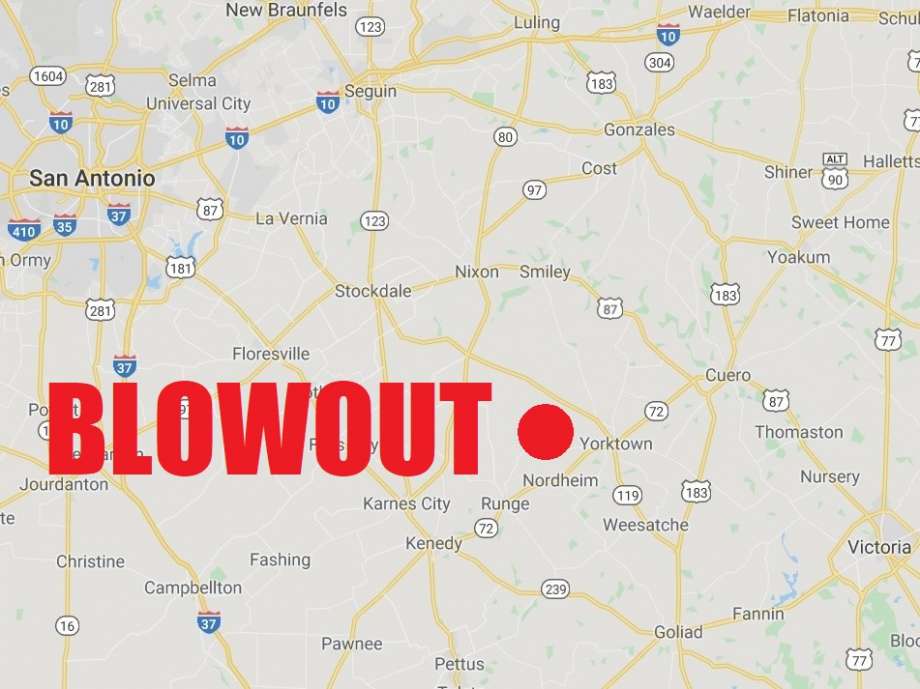Source: Houston Chronicle
Thousands of acres of land remain sealed off days after a blowout at a natural gas well located belonging to Devon Energy between the Eagle Ford Shale towns of Yorktown and Nordheim.
The accident happened at a Devon Energy natural gas well near Cotton Patch Road and FM 952 in DeWitt County early Friday morning. No injuries were reported but authorities evacuated rural families living within a two-mile radius of the blowout, which sent natural gas and other pollutants spewing into the sky and surrounding countryside.

Source: Houston Chronicle
A cause of the accident it not clear but in a statement released on Tuesday afternoon, Devon Energy reported that the company is working closely with local and state authorities and well-control specialists to cap the well and to minimize damages. The company is providing lodging, meals and other needs to the affected families.
“Safety and environmental protection are our highest priorities during this process,” Devon Energy spokesman John Porretto said in a statement. “A number of steps have been taken to contain any fluid runoff at the well site to protect the surrounding environment. We’ll begin assessing any necessary environmental clean-up as soon as it’s safe to do so.”
The Yorktown Volunteer Fire Department reported that authorities shut down Cotton Patch Road, FM 952 between State Highway 72 to Cabeza Road and FM 2656 in response to the accident. The two-mile radius sealed off by authorities is equal to more than 8,000 acres of land.
Numerous residents and neighbors expressed concern on Facebook about their safety and the safety of their livestock, which the company assured the DeWitt County Office of Emergency Management would be taken care of. The Railroad Commission of Texas, the state agency that regulates the oil and natural gas industry, has dispatched an inspector to the site.
Located on Devon Energy’s Migura B lease, the well was originally drilled and completed by the shale drilling arm of British oil major BP but was transferred to Devon on Oct. 28, Railroad Commission records show. Devon brought in Houston oil well blowout specialists Great White Well Control to bring the well back under control, Railroad Commission officials reported.
Sharon Wilson, a Dallas-based anti-hydraulic fracturing activist with the environmental group Earthworks, said the rural poor continue to pay a heavy price for accidents in the oil fields and that regulators do not enforce the law. There have been at least nine blowouts in Texas through July of this year, Railroad Commission records show.
“Devon isn’t Texas’ first repeat offender, or second, despite our state government’s promises of responsible oversight,” Wilson said. “Because neither communities nor climate can trust either companies or regulators, the only way to protect the public interest is to keep it in the ground. And for existing facilities, we need strong rules, reliably and transparently enforced.”
In an initial report filed by Devon Energy with the Texas Commission on Environmental Quality, the company estimated that 12,000 pounds of natural gas will be released during the incident.
Under state law, the company must file a final report with emissions data within two weeks after the end of the accident. TCEQ officials are monitoring air quality in the area and reported that there were no health risks found outside of the two-mile evacuation zone.
Gunnar Schade, an atmospheric studies researcher with Texas A&M University, told the Houston Chronicle that the TCEQ’s air monitoring station in Karnes City — some 18 miles west of the accident — recorded elevated levels of the carcinogens benzene and xylene on Friday, Saturday and Sunday. Although they were temporary spikes, Schade said they were record levels, even for a region accustomed to oil and natural gas drilling.
“I’ve never seen benzene levels that high,” Schade said.

